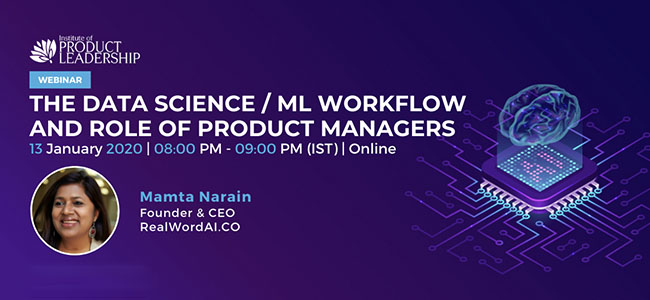Product Management in the Era of Data Science
On 4th April, 2017, the Institute of Product Leadership hosted a webinar by Mandar Parikh, Vice President for Product Management and Engineering at Entytle, Palo Alto, California.
A senior practitioner with experience kick-starting data science products in large enterprises such as salesforce.com as well as startups, Mandar spoke about “Product Management in the Era of Data Science” and shared his thoughts on how to build great products with Data Science.
A senior practitioner with experience kick-starting data science products in large enterprises such as salesforce.com as well as startups, Mandar spoke about “Product Management in the Era of Data Science” and shared his thoughts on how to build great products with Data Science.

Upcoming Events
[add_eventon_list hide_past="yes" hide_empty_months="yes" event_count="15" event_type="105,127,93" number_of_months="4" ]
Data Science is an approach that analyses large amounts of data and extracts patterns and insights; it allows one to makes predictions from them to impact business drivers. Data Science is not something that is new – it is a new term for statistical techniques that have existed for many decades. Data science-enabled products are those products where data science is at the core of the offering – some well-known products using data science at their core are Linkedin, Uber and Salesforce.
To understand in simple terms what data scientists do, Mandar stated that they build models that work on large data sets and make predictions from the models that are built. Mandar outlined the main difference between data science and machine learning – while data science is about models that extract patterns and make predictions, machine learning takes those results and feeds them back into the model and automatically calibrates them to improve the predictions over time.
Mandar emphasised that the fundamentals of Product Management do not change in the face of data science – deep customer empathy remains the most important aspect of Product Management. With data science being just a means to an end – it was important to focus on solving the use case and driving value for the user.
To make the data actionable, interpretability of the data was important. Mandar also asked everyone to note that more data does not necessarily mean better predictions – for example, having old data that is out-of-date could hurt the predictions made by data scientists.
Mandar ended his presentation by encouraging Product Managers to collaborate closely with data scientists and make them an integral part of the product and engineering team. He also stated that there should be no hesitation to bring data scientists into customer conversations, in order to build better products.
The webinar ended with an interesting Q&A, where Mandar answered questions ranging from how to know when the data is completely cleansed and how to successfully implement data science in non high tech companies.
To understand in simple terms what data scientists do, Mandar stated that they build models that work on large data sets and make predictions from the models that are built. Mandar outlined the main difference between data science and machine learning – while data science is about models that extract patterns and make predictions, machine learning takes those results and feeds them back into the model and automatically calibrates them to improve the predictions over time.
Mandar emphasised that the fundamentals of Product Management do not change in the face of data science – deep customer empathy remains the most important aspect of Product Management. With data science being just a means to an end – it was important to focus on solving the use case and driving value for the user.
To make the data actionable, interpretability of the data was important. Mandar also asked everyone to note that more data does not necessarily mean better predictions – for example, having old data that is out-of-date could hurt the predictions made by data scientists.
Mandar ended his presentation by encouraging Product Managers to collaborate closely with data scientists and make them an integral part of the product and engineering team. He also stated that there should be no hesitation to bring data scientists into customer conversations, in order to build better products.
The webinar ended with an interesting Q&A, where Mandar answered questions ranging from how to know when the data is completely cleansed and how to successfully implement data science in non high tech companies.
Facebook
Twitter
LinkedIn
Past Events
Tagged IPL TV-Speaker Series




